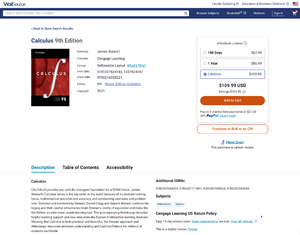VitalSource "Lifetime" false advertising
VitalSource "Lifetime" Access Controversy is in reference to a practice by VitalSource, a large digital textbook & course material provider for college educational markets in the United States, whereby they market some digital products as having "lifetime" access; while defining this term as a limited 5-year period.[3]

![Screenshot of vitalsource' "details" page [1] that is clickable from the bottom of the product page for a calculus book as of 2025-02-18](/thumb.php?f=Vitalsource_calculus_textbook_CA_disclosure.png&width=300)
Background
VitalSource operates as a significant provider of digital educational materials, serving students and educational institutions. The company offers various access durations for their digital products, including what they term "lifetime" access.
Definition and Implementation
According to VitalSource's documentation, they define "lifetime" access as follows:[4]
- Five years of online platform access
- Ability to download content to supported devices during this period
- Support limited to device compatibility at time of download
This definition appears in their California Digital Goods Disclosure documentation, published December 18, 2024, in response to AB 2426 compliance requirements with the new law.[5]
Overarching problem
This practice is a perfect demonstrator of the key issue in modern digital goods ownership:
Redefining Common Terms
- The term "lifetime" is commonly understood to mean the entire life of either the purchaser or the product
- VitalSource's use of the term to mean a fixed 5-year period is a departure from traditional consumer understanding of the word lifetime
License vs. Ownership
- Products marketed with "lifetime" access remain under licensing restrictions
- Access can be revoked or limited based on platform support & device compatibility
- Downloads are contingent on maintaining "supported device" status, a term that they do not clearly define, only indicating it means "the two most recent versions of an operating system" but not identifying on which devices, apps or operating systems downloads of a title are supported.
Regulatory Response
California's AB 2426[6], effective January 1, 2025, addresses this type of false advertising by requiring companies to:[5]
- Explicitly disclose when digital goods are licensed rather than owned
- Clearly and conspicuously[7] communicate access limitations & conditions
- Obtain affirmative acknowledgment from consumers regarding license terms
Current Status
As of January 2025, VitalSource has updated their disclosure documentation but continues to use the term "lifetime" in their marketing, with the 5-year definition disclosed in their terms of service and support documentation.[4] Even though they claim to have complied with the regulation, consumers still must dig further to learn that what is marketed as "lifetime" is anything but. When "180 days" and "1 year" options are chosen, the site clearly and conspicuously displays an Expires on: <date, e.g. Jul 5, 2026> message on the main webshop page, pushing shoppers to the higher priced "Lifetime" option. When "Lifetime" is selected, that is not replaced with another date (e.g. 5 seconds or 5 years out); instead it is hidden, which is deceptive, the opposite of clear and conspicuous. The "eTextbook License" text is not larger or contrasting, and is marked with only a single ℹ︎ symbol.
References
- ↑ https://www.vitalsource.com/products/calculus-james-stewart-daniel-k-v9798214339221
- ↑ https://web.archive.org/web/20250126183825/https://support.vitalsource.com/hc/en-us/articles/28012656781847-CA-Disclosure-Support-Page
- ↑ https://support.vitalsource.com/hc/en-us/articles/28012656781847-CA-Disclosure-Support-Page
- ↑ 4.0 4.1 VitalSource Technologies LLC. (2024, December 18). "CA Disclosure Support Page". VitalSource Support. Retrieved January 31, 2025.
- ↑ 5.0 5.1 California State Legislature. (2024). AB 2426 Consumer protection: false advertising: digital goods. Retrieved January 31, 2025.
- ↑ https://leginfo.legislature.ca.gov/faces/billStatusClient.xhtml?bill_id=202320240AB2426
- ↑ Bill definition: (1) “Clear and conspicuous” means in a manner that clearly calls attention to the language, such as in larger type than the surrounding text, or in contrasting type, font, or color to the surrounding text of the same size, or set off from the surrounding text of the same size by symbols or other marks.